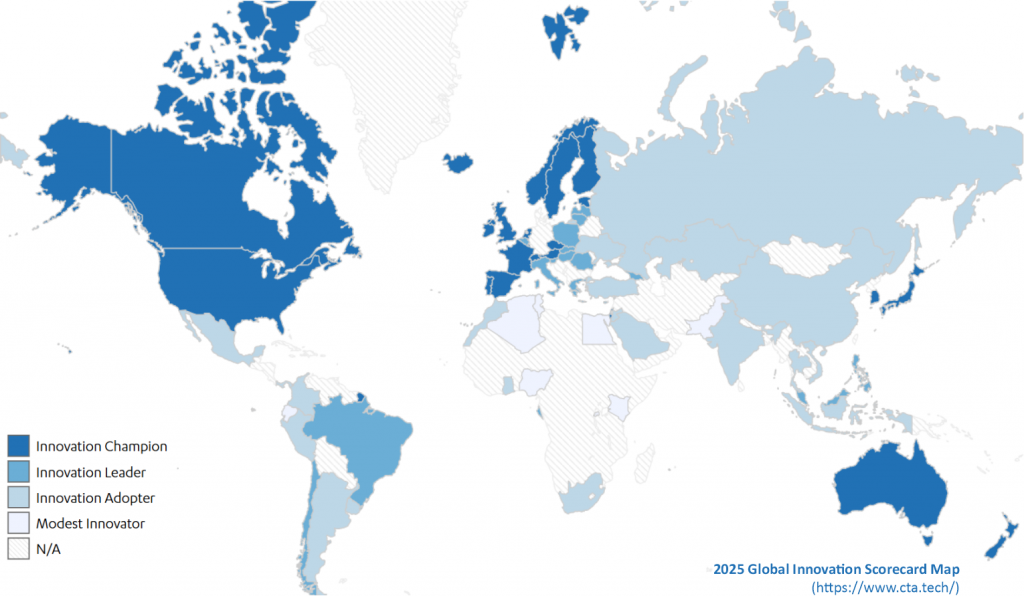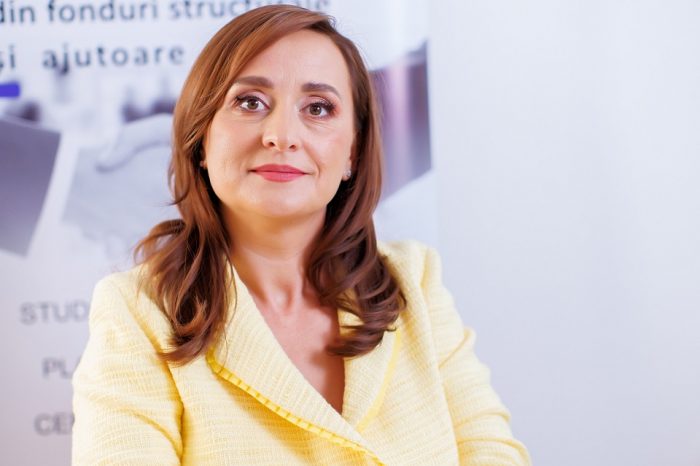Softech: Romania in the 2025 Global Innovation Scorecard

Romania in the 2025 Global Innovation Scorecard is ranked 39th as of January 2025. On the hype with all the innovations launched and announced at CES 2025, we also welcome the latest release of the Global Innovation Scorecard. With this fourth edition, the CTA – Consumer Technology Association, producer of CES tech event, enlarged the Global Innovation Scorecard by evaluating 74 countries, including the entire G-20, all 27 members of the European Union, and the EU as a whole.

About the 2025 Global Innovation Scorecard
The Global Innovation Scorecard includes large and established trading partners of the United States, and many emerging market countries driving innovations that improve the human condition. The study classifies the analyzed markets in five categories: innovation champions, innovation leaders, innovation adopters, modest innovators and N/A.
The analysis follows 56 indicators across 16 categories. According to the CTA report, the actual “measurements identify the countries that most strongly encourage tech innovation, economic growth, and social progress, and the policies other countries could emulate to deliver similar benefits to their people.”
The conclusions of this 4th edition reflect the dynamic tech, political and social landscape of the recent years. The authors pin 2025 as a historical inflexion point, when perspectives on innovation and its use clash. There are contrasting approaches on innovative technologies standards, regulation, education and actual use, across the studied countries and continents.
Europe Union, as a whole, felled out the innovation champion list, mainly as a result of the policies inflicting data routing and storage restrictions and limiting freedom on social media platforms.
On the other hand, the global trade war escalates as we speak, fueled by rising trade tarrifs. The urge to protect the institutions that generated the global tech boom is imminent.
2025 Innovation Champions
As we can observe in the report, the 2025 Global Innovation Champions are actually those countries that top-scored for the overall set of indicators such as highly skilled workforce, super-fast broadband connections, friendly entrepreneurial environment, openness to new technologies and business models. These economies generally embrace Web 3.0 technologies, create a favorable block chain startup ecosystem, place no undue restrictions on cryptocurrencies, favor testing and operation of advanced self-driving cars and many other innovations.
The innovation champions in the 2025 Global Innovation Scorecard are, in order: Singapore, USA, New Zealand, Sweden, Switzerland, Canada, Norway, UK, Iceland, Estonia, Finland, Australia, Luxemburg, Netherlands, Denmark, Ireland, Japan, South Korea, France, Czech Republic, Spain, Israel, Germany, Portugal, Austria.
We have been expecting to find reputed innovators such as USA and UK, heavyweight innovators like Japan, Germany, France and New Zealand in the above top 25, but are also impressed by lightweight innovators such as Estonia or Ireland.
2025 Innovation Leaders
This year, the Global Innovation Scorecard reveals 21 Innovation Leaders. These are countries with high grades in most of the categories analyzed by the Scorecard. To sum it up: these countries have relatively high degrees of economic and personal freedom; they supply properly educated workforce, show intense entrepreneurial activity and shy or emerging R&D investments.
The Innovation leaders’ category mixes major industrialized economies, growing Pacific economies and advancing Eastern European economies.
The 2025 Innovation Leaders are, in order: Lithuania, Belgium, Slovenia, Latvia, Poland, Costa Rica, Malaysia, Malta, Croatia, Slovakia, Georgia, Italy, Romania, Greece, Cyprus, Brazil, Bulgaria, Philippines, Hungary and Chile.
Romania in the 2025 Global Innovation Scorecard: Innovation Leader
As far as our market is concerned, Romania’s composite score places the country as an “Innovation Leader” and ranks 39 out of 74 economies. Let us understand why, by following each indicator proposed by the CTA’s 2025 Global Innovation Scorecard.
Actual Diversity. In Romania, immigrants constitute around 3.7 % percent of the population, and from a global perspective, Romania is considered to lack ethnic diversity. In addition to that, the below-average level of gender parity among workers with ages between 25-54 reflects a low diversity in the labor market.
Fundamental Freedoms. Even if the recent political turmoil generated confusion, Romania is considered to have a high level of both personal and political freedom.
Resilience & Digital Transparency Promotion. In the last decades, Romania has proven a great capacity to withstand and recover disruptive events. In addition to that, e-government services are reinforced anywhere where possible.
Investment in Skilled Workforce. This is a chapter where Romania has much work to do. Only 15.31 % of Romania’s workers have tertiary education, and the country has a low availability of scientists and engineers. Only 29.09 % of its college degrees fall under the STEM fields.
Telehealth Encouragement. Given the post-pandemic context, Romania actually allows telehealth visits for a wide range of healthcare services. Romania has no sunset clauses for telehealth services.
Acts Green. Romania scored high for this indicator since the air quality in Romania nearly meets the World health Organization standards, and 100 percent of the country’s population uses clean and protected water sources.
Cross-Border Data Flows. Unfortunately, Romania has in place a data localization law, therefore cloud storage providers have to store data within its borders; Next, the data transfer law, requires cloud storage providers to route data flows according to strict directives; Nevertheless the country is engaging in bilateral or multilateral discussions to allow easier flow of data.
Digital Platforms Friendliness. Romania has special regulation and/or enforcement for Very Large Online Platforms (VLOPs) or Very Large Online Search Engines (VLOSEs)
Pro-Innovation Legal Environment. Romania has received above average scores for its legal climate.
Start-Up & Small Business Friendliness. Romania scores well for this chapter since new business creation is active. On the other hand, from an innovation perspective, the country has a low normalized rate of creating Unicorns.
Global Tech Trade Encouragement. Romania was prompt to join WTO’s ITA (Information Technology Agreements) of 1997 and 2015 and has an active information and technology trade.
Tax Friendliness. Romania scores high at this chapter since there is a corporate tax rate of 16 percent and a top individual tax rate of 10 percent.
R&D Friendliness. Unfortunately, this is where Romania needs to make major steps ahead. With a spending of only 0.5 percent of its GDP on R&D activities, Romania is far behind other EU countries.
Encourages Broadband. Considering the mean download speeds (Mbps) in Romania, this chapter must also be improved, considering the globally available indicators.
Self-Driving Vehicles. Romania allows testing approved Level 4 self-driving technologies to a limited extent, or does not explicitly prohibit these.
Blockchain Friendliness. With an active blockchain environment, Romania does not ban the use or exchange of cryptocurrency; nevertheless, stablecoin availability is restricted under the EU MiCA framework.
Conclusions about Romania on the 2025 Global Innovation Scorecard Map
After analyzing the global innovation scorecard map prepared by the CTA market research team, we can see that Romania has many things to learn and adopt from the already established innovation champions and the innovation leaders. It is also observable, that Romania has also to find its own way in this complex landscape of innovation, especially in the information and technology sector.
From a Romanian company’s perspective, SOFTECH – based in Cluj-Napoca, we can see that the ITC sector in Romania is always striving to achieve its best in the given conditions. With +25 years of software development history behind, we can say that change is constant and we are ready to tackle any challenge. If you are in search of a future partner for software development in Romania, you are welcome to contact us, directly.
——
About CTA – Consumer Technology Association: Being North America’s largest technology trade association, CTA® is the tech sector. The members of CTA are the world’s leading innovators — from dynamic startups to established global brands. CTA’s mission focuses on promoting innovation beneficial to the human condition. It advocates pro-innovation policies, provides market research, promotes technology innovation and develops standards, and creates opportunities to foster business and strategic relationships. CTA also owns and produces CES® — the world’s most powerful tech event.
photo credits: https://www.cta.tech/Advocacy/Innovation-Scorecard/Global-Scorecard













